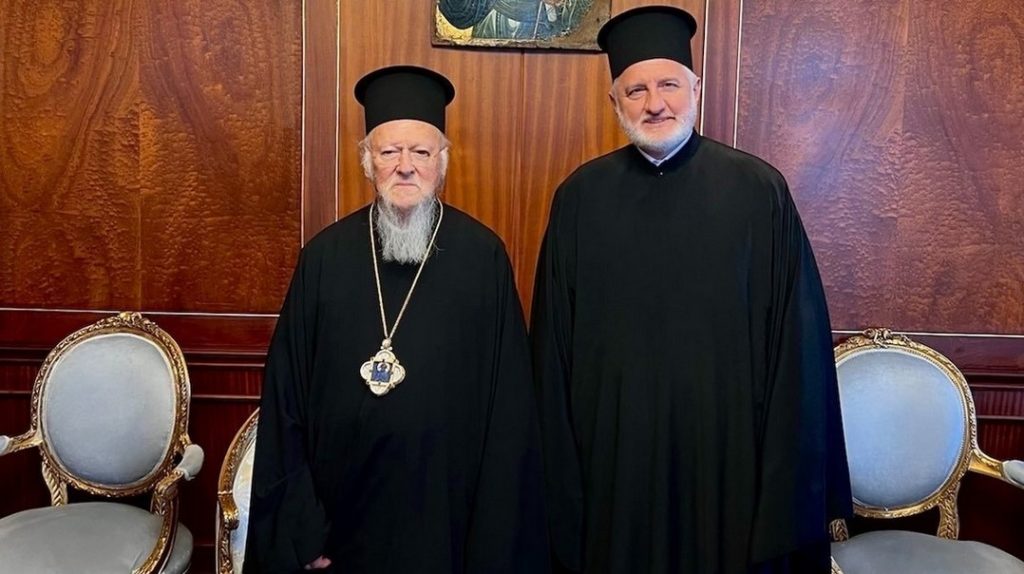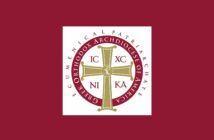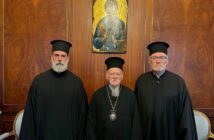Source: The National Herald
By Christopher Tripoulas

From the visit of Archbishop Elpidophoros with Patriarch Bartholomew at the Phanar in August 2022. (Photo GOARCH
It’s a new year, but the Archbishop’s recent meeting at the Phanar regarding amendments to the Archdiocese of America’s Charter is more like a blast from the past. This on-again, off-again process, which began in the fall of 2019 with the sudden suspension of the Charter by the Ecumenical Patriarchate, was thought to have ended last June when the Patriarchate restored the Charter at the “request” [sic]of the Archdiocese. However, no sooner did this thoroughly botched matter seem to have been resolved, when it was awkwardly revisited, following a cryptic announcement by the Patriarchate.
The issue is now officially being discussed by members of the relevant committees formed by the Patriarchate and Archdiocese. It’s worth noting that in the three-plus years that the question of a new Charter emerged, most of the stakeholders (the bishops and clergy serving in America, and the laity who keep the parishes and Archdiocesan ministries operational through their support) haven’t the slightest inkling about the proposed changes or even the reason for them. Most of the senior clergy in Constantinople and rotating synod members are probably equally clueless regarding the matter. And yet, the Mother Church and its eparchy appear to be pushing ahead – despite the obvious pitfalls this could pose for both.
For most Greek Americans, it’s not really worth expending too much gray matter over the Charter due to its colossal irrelevance. Whatever changes do get implemented will do next to nothing to address the chronic issues plaguing the Community and Church, much like the previous changes. Regardless of whether the Archbishop dissolves the Metropolises and asserts sole control over the entire eparchy, or if the Metropolitans go back to being titular bishops, there’s no escaping reality… Parishes will still struggle to pay their bills, Greek parochial schools will continue to combat dwindling enrollment and financial strain due in large part to the complete absence of strategic planning and coordination, mixed marriages will continue to grow and pose a viability risk due to demographical consequences, unless these couples and their children can be actively engaged over the long-term, Holy Cross Seminary/Hellenic College will remain a money pit, etc.
Still, the manner in which the situation is being handled warrants serious concern because it reveals an underlying issue that is far more serious than the Charter itself. The absence of coordination and the fragmentation within the Community is one of the greatest obstacles to attaining progress and tackling most systemic issues. Changes to the Archdiocese’s main governing document are being discussed, yet even some of the ranking members in the Church don’t know what’s going on. Needless to say, other Community institutions and major organizations don’t seem to have been consulted either.
The Ecumenical Patriarchate’s right to issue and amend its eparchy’s Charter is not at question here. However, in this instance, the mentality and mindset of the key players are cause for skepticism. One of the signature qualities of the Greek-American Community is the high level of education of many of its members. When factored in with Hellenism’s traditional prowess in matters of local administration and self-governance, this constitutes all the more reason to truly involve the stakeholders in a democratic dialogue about what form the new Charter should take and what shortfalls of the past require remediation. It’s unwise to marginalize such an asset – especially in the clumsy manner in which this has been done over the past three years.
While it’s too early to tell what this dialogue over proposed changes to the Charter will produce, much less to evaluate them, it’s fair to say that the handling of the situation up until now has been subpar. At best, the process has been secretive and paternalistic, while the limited input from the popular base seems counterintuitive to coming up with a more functional Charter. At worst, it’s a power play by a relatively new and inexperienced archbishop that smacks of self-serving interest.
Besides the disservice to the Community, those who possess filial love for the venerable institution of the Ecumenical Patriarchate worry that this course may alienate it from the faithful in America, and even produce resentment among its traditional supporters. Rather than strengthen the bond between the Archdiocese and the Phanar, a new Charter – if it continues to be mishandled, as is presently the case – may end up driving a wedge between them and play into the hands of those seeking to wrestle Constantinople’s largest eparchy away from it.
Rather than obsessing about the Charter, it would be more expedient and advisable to focus on the chronic issues and challenges that pre-date the last few charters and will continue to exist after the next one. Therein lies the substance. All the rest is just fluff.
Follow me on Twitter @CTripoulas



